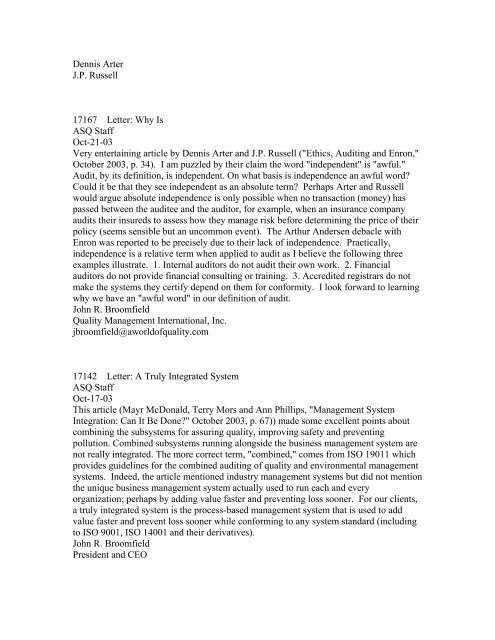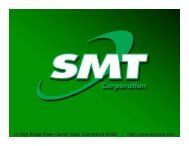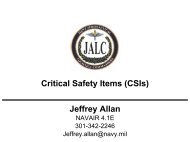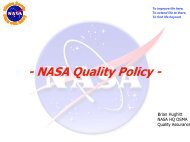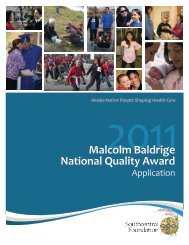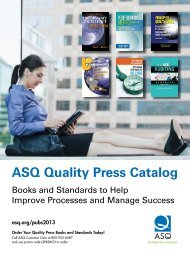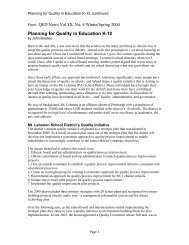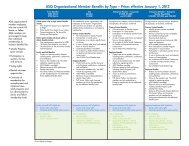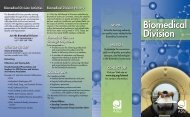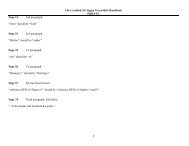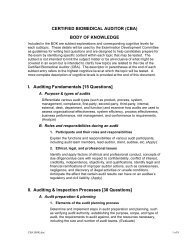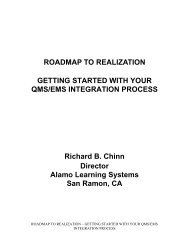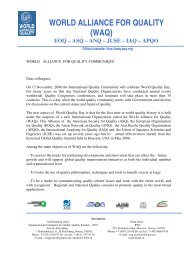Quality Progress - American Society for Quality
Quality Progress - American Society for Quality
Quality Progress - American Society for Quality
You also want an ePaper? Increase the reach of your titles
YUMPU automatically turns print PDFs into web optimized ePapers that Google loves.
Dennis Arter<br />
J.P. Russell<br />
17167 Letter: Why Is<br />
ASQ Staff<br />
Oct-21-03<br />
Very entertaining article by Dennis Arter and J.P. Russell ("Ethics, Auditing and Enron,"<br />
October 2003, p. 34). I am puzzled by their claim the word "independent" is "awful."<br />
Audit, by its definition, is independent. On what basis is independence an awful word?<br />
Could it be that they see independent as an absolute term? Perhaps Arter and Russell<br />
would argue absolute independence is only possible when no transaction (money) has<br />
passed between the auditee and the auditor, <strong>for</strong> example, when an insurance company<br />
audits their insureds to assess how they manage risk be<strong>for</strong>e determining the price of their<br />
policy (seems sensible but an uncommon event). The Arthur Andersen debacle with<br />
Enron was reported to be precisely due to their lack of independence. Practically,<br />
independence is a relative term when applied to audit as I believe the following three<br />
examples illustrate. 1. Internal auditors do not audit their own work. 2. Financial<br />
auditors do not provide financial consulting or training. 3. Accredited registrars do not<br />
make the systems they certify depend on them <strong>for</strong> con<strong>for</strong>mity. I look <strong>for</strong>ward to learning<br />
why we have an "awful word" in our definition of audit.<br />
John R. Broomfield<br />
<strong>Quality</strong> Management International, Inc.<br />
jbroomfield@aworldofquality.com<br />
17142 Letter: A Truly Integrated System<br />
ASQ Staff<br />
Oct-17-03<br />
This article (Mayr McDonald, Terry Mors and Ann Phillips, "Management System<br />
Integration: Can It Be Done?" October 2003, p. 67)) made some excellent points about<br />
combining the subsystems <strong>for</strong> assuring quality, improving safety and preventing<br />
pollution. Combined subsystems running alongside the business management system are<br />
not really integrated. The more correct term, "combined," comes from ISO 19011 which<br />
provides guidelines <strong>for</strong> the combined auditing of quality and environmental management<br />
systems. Indeed, the article mentioned industry management systems but did not mention<br />
the unique business management system actually used to run each and every<br />
organization; perhaps by adding value faster and preventing loss sooner. For our clients,<br />
a truly integrated system is the process-based management system that is used to add<br />
value faster and prevent loss sooner while con<strong>for</strong>ming to any system standard (including<br />
to ISO 9001, ISO 14001 and their derivatives).<br />
John R. Broomfield<br />
President and CEO


